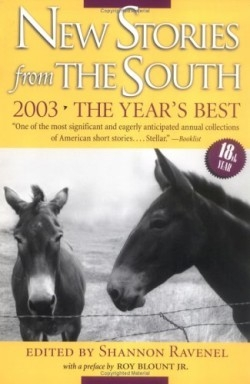New Stories from the South
The Year's Best 2003
A common witticism proclaims that every Southern work of fiction has to contain a dead mule. There are no dead mules in this year’s collection of Southern stories, but there is a picture of a mule on the cover, which may be a joke on the lingering stereotypes about the South and Southern fiction that this yearly anthology has tackled time and time again.
The editor probably knows more about Southern writing than anyone who has ever taken red pen to manuscript. She has more than forty years of experience in the publishing world. In 1983 she and Louis Rubin founded Algonquin Books, which was the first to publish such now-noted Southern authors as Larry Brown, Kaye Gibbons, Robert Morgan, and Clyde Edgerton. In 2001, she stepped aside as the press’s editorial director to assume the directorship of her own imprint line. Every year, Ravenel weeds through hundreds of magazines searching for stories to fill her annual collection of the best new stories from the South. This book is the eighteenth such collection, and one of the better ones.
There are many familiar names, most notably Dorothy Allison, whose Bastard Out of Carolina marked her crossover from the lesbian specialty presses to the bestseller list in the late 1980s. Humorist Roy Blount Jr. provides this year’s celebrity introduction, an entertaining meditation on being a writer and on people’s reaction to those who pursue such a strange career. But the best writing in the 2003 anthology belongs to lesser-known voices, those who have yet to publish widely read books and who in many cases are redefining the Southern literary landscape.
Brock Clarke’s “For Those of Us Who Need Such Things” is a semi-surrealistic story about a man who buys the city of Savannah in an attempt to win back his estranged wife. He populates his new acquisition with a literary society consisting of old white women (all good-sized Southern cities need one), a restaurant run by black women (the society ladies need some place to do lunch, after all), and a guerilla theater group of black men who drink fake beer from forty-ounce containers while hurling voodoo curses at the literary ladies as they go into the restaurant. In the end, the protagonist learns that “you can’t just buy a two-hundred-and-seventy-year-old city and expect it to be real, any more than you can cheat on your wife and expect her to love you again.” Ultimately, the story becomes a metafictional meditation on the fictions people live by in their day-to-day lives.
Men who are losing or have lost their wives or girlfriends is a frequent theme this year. With “Johnny Too Bad,” John Dufresne tackles this theme, revealing in the process why his works have twice been named a New York Times Notable Book of the Year. His story builds slowly but explodes like a hurricane when it arrives.
The genre of the short-short is represented by Lucy Corin. Her brief piece is about class tensions during a summer beach trip. In a story that is no longer than this review, Corin creates a narrative complete with a memorable character, building tension, and resolution.
Brad Vice’s “Report from Junction” is probably the most traditionally Southern-feeling story in the anthology, and arguably the best of the lot. It may lack a dead mule, but it does have a dying calf, along with several sly and humorous references to other Southern writers. The story has the same emotional intensity as Bear Bryant’s pre-season training camp, which serves as the story’s backdrop. Vice is one of four authors in this year’s collection who have yet to publish a book. “Report from Junction” makes the reader eagerly anticipate his first novel or collection.
Ravenel’s ability to spot and encourage emerging talent is one of the qualities that makes her a great editor, but she also has deep respect for established writers (and the respect of those writers as well). Every year, her collection provides a snapshot of the current state of Southern letters and the direction it is heading. Two thirds of the stories in this year’s collection, for instance, were written by men, which may be an indication of the shifting Southern literary landscape. For the last several decades women writers have dominated the scene. Regardless of the gender of its contributors, though, New Stories from the South remains the best of the yearly anthologies, even without dead mules.
Reviewed by
Erik Bledsoe
Disclosure: This article is not an endorsement, but a review. The publisher of this book provided free copies of the book to have their book reviewed by a professional reviewer. No fee was paid by the publisher for this review. Foreword Reviews only recommends books that we love. Foreword Magazine, Inc. is disclosing this in accordance with the Federal Trade Commission’s 16 CFR, Part 255.

